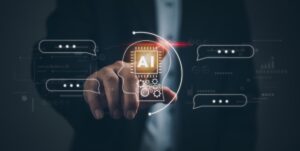(PopTika/Shutterstock)
From the industrial revolution to the first computer, tech innovation has consistently revolutionized and enhanced the way we live and work. Most recently, AI burst onto the scene creating a cascade of hype, promise, and a variety of new AI-focused jobs and use cases – but with this shift have come concerns about job displacement and the long-term risks of such a novel technology.
While everyone has an opinion on AI, people might not realize they’ve been using it for years. Most of us have daily interactions with friendly bots and virtual assistants, like Alexa, Siri, or even the chatbot that pops-up when you visit a company’s website. Long before generative AI’s meteoric rise, the most personal parts of our lives were integrated with AI – think about how often you ask Siri to look something up for you!
Now, AI is more tangible – and visible due to the rise of ChatGPT, AI art generators, and more. AI is more ingrained in our day to day lives than it ever has been before – and this trend is only likely to intensify as businesses across the globe scramble to harness its tremendous potential.
Today, humanity is at a critical juncture. It’s our responsibility to guide this transformative technology and ensure it operates with a moral compass that augments everything we do instead of replacing human workers.
The question is, what’s next? Humans and AI are already deeply intertwined, but how will this trend evolve into 2024 and beyond? Here are three ways:
Careful AI Regulations Will Ensure Job Protection
Across the world, bills will be introduced to ensure that AI complements human roles and is always carefully governed and monitored by humans. New regulations will protect certain jobs from displacement and create brand new roles and career opportunities. In industries where it’s more pragmatic to use AI, there will be strict requirements to train employees for roles overseeing, developing and maintaining the technology. We’ll also see additional ways for employees to partner with AI, helping to enhance their performance and work experience significantly.
As AI becomes increasingly integrated in business operations, conversations will intensify around who is responsible for preparing the younger workforce for hybrid human/AI roles. Political leaders may debate the merit of higher education courses and on-the-job-training to account for potential skills gaps among entry level roles, whose tasks may be accomplished through AI-powered solutions.
Deepfakes Will Become a Customer Experience Security Concern
AI deepfakes are making waves due to their ability to sow disinformation and misrepresent recognizable faces. This risk isn’t for public figures alone; now, even average consumers need to watch out for misinformation and identity breaches.
In a customer service setting, we’ll begin to see bad actors deploying deepfakes of consumers to defeat biometric verification and authentication methods. While this technology is still new and developing, the rapid advancement of AI accelerates the likelihood for customer trust and security to be disrupted. To prepare, businesses will need to prioritize authentication technology to address these risks, to ensure that their customers are not at risk of exploitation.
AI Will Cause Strategic Business Plans to Change
This year, business leaders must examine the evolving role AI will have in their workplace operations or they risk an array of challenges, value losses and talent drain. Organizations will need to rethink their long-term strategic plans if they fail to consider AI’s role in the future of their companies. AI will have a meaningful impact on many companies’ structures and scale, and businesses need to have a plan in place for it.
This trend will become increasingly urgent as AI evolves into artificial general intelligence — where applications could be less dependent on humans. Business leaders cannot afford to look at AI technology as just another workplace tool, and must carefully plan for the AI future.
Keeping the Human Touch
AI is the newest contender in a long line of disruptive technologies, and it has the potential to significantly impact our lives and the pace of innovation. If we ensure humans are always at the core of AI and are thoughtful in how we deploy and use the technology, we’ll be able to protect jobs, ensure strong security measures, and use AI for good. The future of AI is bright, but humans need to be involved every step of the way to ensure we guide the technology effectively.
About the author: Brett Weigl is senior vice president and general manager of digital, AI, and journey analytics at Genesys. As a seasoned enterprise SaaS product management leader with more than 20 years in hi-tech, Brett oversees the company’s digital-first solutions for complete customer experience and AI across both digital and the contact center. Previously, Brett led the Digital Engagement product management team at Salesforce Service Cloud. Prior to Salesforce, Brett led product for social media engagement solutions at ExactTarget.
Genesys. As a seasoned enterprise SaaS product management leader with more than 20 years in hi-tech, Brett oversees the company’s digital-first solutions for complete customer experience and AI across both digital and the contact center. Previously, Brett led the Digital Engagement product management team at Salesforce Service Cloud. Prior to Salesforce, Brett led product for social media engagement solutions at ExactTarget.
Related Items:
Data Quality Is A Mess, But GenAI Can Help
GenAI Is Putting Data in Danger, But Companies Are Adopting It Anyway
What’s Holding Up the ROI for GenAI?
Source link
lol



